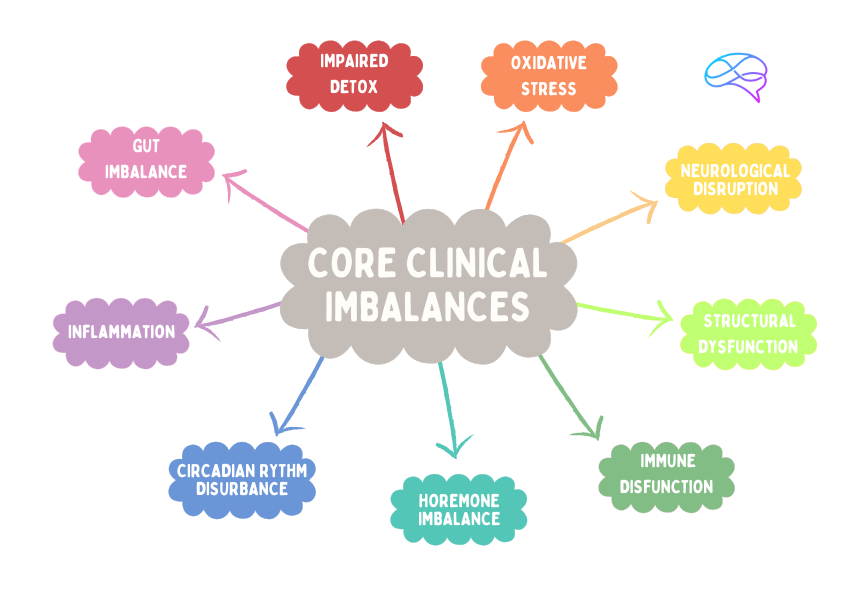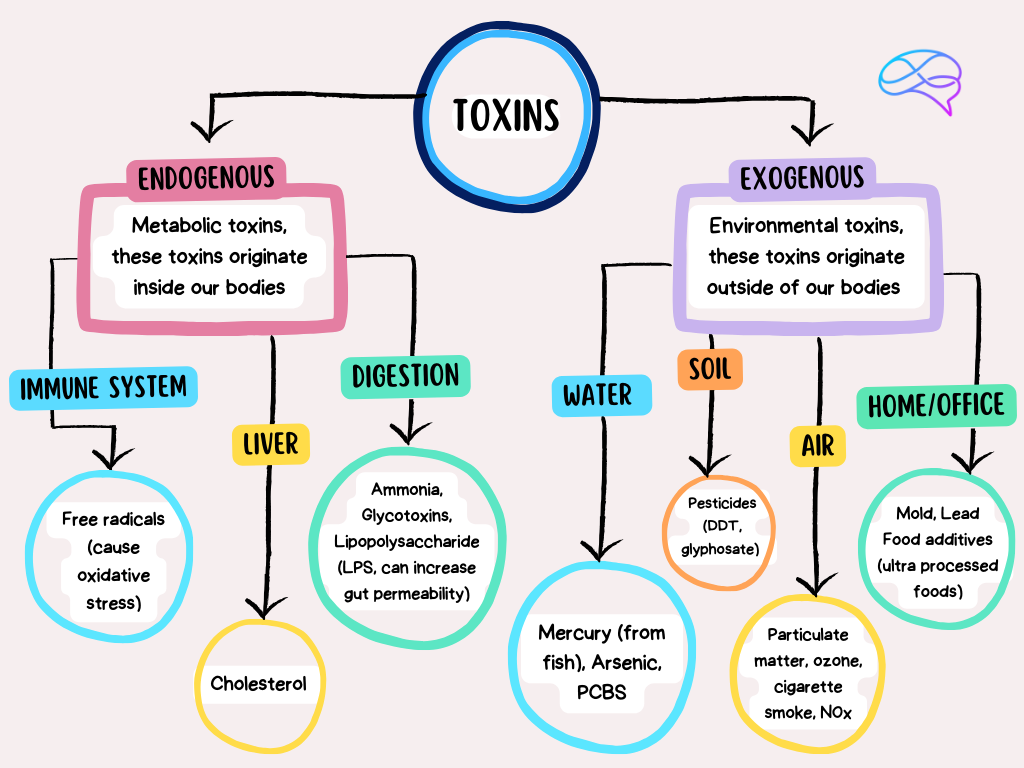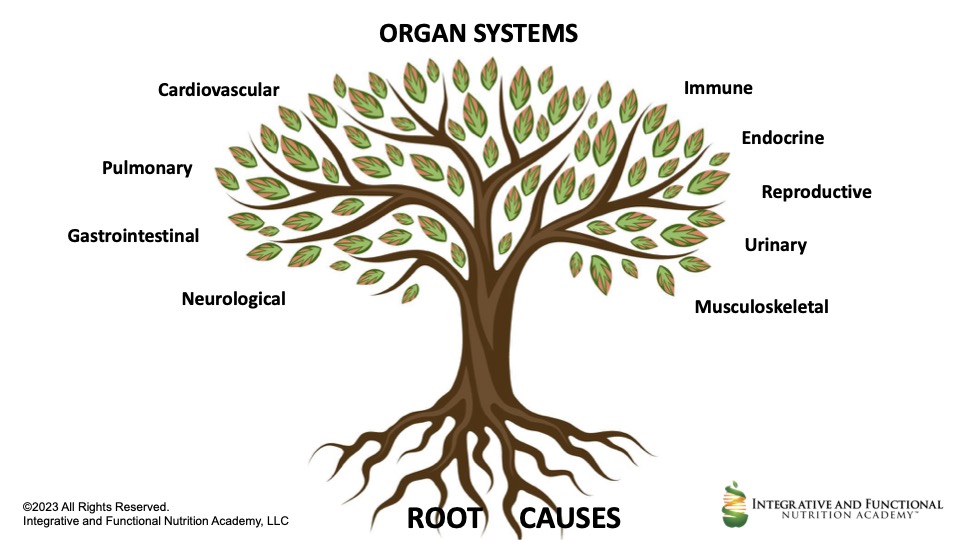The 5 Factors that are the Root Cause of ALL your Health Problems
Root cause analysis is a way of problem solving in many disciplines and it involves figuring out what the cause of the problem really is. It is particularly important when considering your health. Many doctors do not use root cause analysis in their approach and instead prescribe medicines to treat the symptoms rather than the underlying causes. However, this does not necessarily heal the person, as the root cause of the issue was not addressed and the issue is likely to reoccur!1,2 Let’s learn about the 5 root causes that functional and integrative nutrition specialists use to identify problems.
What are system imbalances?

The root causes underlying all system imbalances can be traced back to the following 5 categories.
1. Stress
Stress includes both physical and psychological factors. Our bodies are much more equipped to handle acute (short lived) stress. However, when we are under chronic stress (constant everyday stress) this can have negative health effects and can be especially harmful to our gastrointestinal tract and detoxification pathways. Oxidative stress can result from toxins (both endogenous & exogenous) interacting with the structures in our bodies causing changes that lead to cell death and eventual loss of organ function. Mitochondria can be damaged from oxidative stress leading to dysfunction in our energy production. Stress can also come from consuming the standard American diet and lack of sleep which both keep our bodies in a pro-inflammatory state.1,2
Here’s some ways stress affects your body (especially our heart & gut):3
- Your heart rate increases and your blood vessels contract, leading to an increase in blood pressure (increase the burden on the walls of your blood vessels).
- The brain signals to your adrenals to produce hormones (adrenaline) and steroids (cortisol). Particularly in the case of chronic stress, cortisol increases.
- Blood vessels in our extremities constrict to minimize blood loss in the case of an injury. You may notice your hands or feet get cold in stressful situations.
- Your blood clots more easily, again to decrease blood loss in the case of injury.
- Muscle contraction (may be why you experience tense neck, shoulders, etc.)
- Your gut lining also contracts, quickly removing any food from your gastrointestinal (GI) tract in an attempt to prepare for “fight or flight”. Your body cannot properly ingest nutrients in this state.
You can see how these mechanisms are designed to help us in times of danger, but they end up causing big problems for our health when they are chronically experienced.
2. Toxins
Toxins can be generally described as either endogenous or exogenous. Exogenous toxins come from the environment around us. This can be toxins/pollution in your home, office, air, soil, and water. Endogenous toxins, or metabolic toxins, come from inside our bodies and include things like ammonia, glycotoxins, cholesterol, and lipopolysaccharides (LPS). Toxins can also be elements, like mercury, synthetic like glyphosate (Roundup), DDT, or bisphenol-A (BPA) or heavy metals like lead.1,4
Detoxification is closely related to gut health and your gut microbiome. Poor gut health, or dysbiosis, can be the result of poor diet, use of antibiotics, and use of proton pump inhibitors. Toxins affect the gut microbiome in 3 major ways:
- Decreased microbial diversity → associated with irritable bowel disease IBD, irritable bowel syndrome (IBS), acute diarrhea, and Clostridium difficile-associated disease (CDAD). Loss in microbiome diversity can leave us more susceptible during times of stress since it can lead to decrease in certain microbiome species that are specialized to function with limited resources.5
- Changes in microbial metabolites (products of metabolism) → changes in these molecules change our physiology since metabolites act as signaling molecules for a diverse range of reactions in the body. These changes can result in signaling of pro-inflammatory pathways.5
- Changed energy metabolism → the gut microbiome plays a direct role in energy production, using polysaccharides to produce energy substrates. Changes to the gut microbiome can lead to changes in metabolism that result in conditions like malnutrition or obesity.5
What causes estrogen dominance? → This is an example of an endogenous toxic exposure. In order to be excreted, estrogen bonds to glucuronide molecules. Poor gut health can lead to increased activity of enzymes like beta-glucuronidase which breaks the bond, separating the estrogen and glucuronide. Unbound estrogen cannot be excreted so instead your body puts estrogen back into hepatic circulation. This can lead to an accumulation of estrogen in your body!1

3. Adverse Food Reactions
4. Infections
Infections come from many sources:
- Bacteria
- Fungus
- Parasites
- Virus
Infections naturally drive inflammation in our bodies, however, when left unchecked the inflammation can be chronic. Your gut microbiome contains ~70% of the immune system, so gut health can have a big influence on how your body responds to foreign invaders.8
Stress, chemical injury (from toxins), adverse food reactions, and infections can all cause the permeability of your gut to increase (this is known as leaky gut). This means that the tight junctions of the membrane in your GI tract become damaged and loosen, allowing proteins, peptides, and antigens to leave the GI tract and travel to the lymph nodes or bloodstream. Your immune system detects that these molecules are not where they are supposed to be and regards them as a foreign invader, triggering your immune system to create antibodies and increase inflammation. This is also a mechanism in gluten intolerance, meaning gluten leaves your gut and your body creates antibodies to fight it! Over time, if the inflammation becomes chronic it leads to tissue damage. As the antibodies continue to be produced they interact with other tissues in your body and their receptors. This can lead to dysfunction in just about any organ system in your body including the brain, heart, prostate, ovaries, joints, thyroid, kidneys, and adrenals!1,9
5. Nutritional Imbalances
My Two Cents!
It is important to remember that these 5 factors are intricately intertwined. For example, nutrient cofactors are required for detoxification in the liver. Some co-factors that are needed for liver detoxification include riboflavin (vitamin B12), niacin (vitamin B3), (vitamin B6), folic acid, amino acids like glycine, taurine, and glutamine. Therefore consuming a diet low in these nutrients can cause nutritional imbalances that lead to inhibition of detox pathways. There are tons of other examples of how one or more of these root causes simultaneously affect each other and cause system imbalances. In most cases, there is not a magic bullet to getting your health back on track but instead requires comprehensive lifestyle changes in many of these root cause areas!
Interested in reading more? Here’s our references!
- Blogs. Integrative and Functional Nutrition Academy. Accessed February 11, 2024. https://www.ifnacademy.com/blogs/
- Functional Medicine: Advancing the Highest Expression of Individual Health. The Institute for Functional Medicine. Accessed February 11, 2024. https://discover.ifm.org
- Ornish D. Chapter 3: Yes, That’s True, But What is the Cause?. In: Dr. Dean Ornish’s Program For Reversing Heart Disease. 1st ed. Ballantine Books; 1990:63-74.
- Ross MK, Matthews AT, Mangum LC. Chemical Atherogenesis: Role of Endogenous and Exogenous Poisons in Disease Development. Toxics. 2014;2(1):17-34. doi:10.3390/toxics2010017
- Tu P, Chi L, Bodnar W, et al. Gut Microbiome Toxicity: Connecting the Environment and Gut Microbiome-Associated Diseases. Toxics. 2020;8(1):19. Published 2020 Mar 12. doi:10.3390/toxics8010019
- Rojas M, Restrepo-Jiménez P, Monsalve DM, et al. Molecular mimicry and autoimmunity. J Autoimmun. 2018;95:100-123. doi:10.1016/j.jaut.2018.10.012
- Vojdani A. Molecular mimicry as a mechanism for food immune reactivities and autoimmunity. Altern Ther Health Med. 2015;21 Suppl 1:34-45.
- Wiertsema SP, van Bergenhenegouwen J, Garssen J, Knippels LMJ. The Interplay between the Gut Microbiome and the Immune System in the Context of Infectious Diseases throughout Life and the Role of Nutrition in Optimizing Treatment Strategies. Nutrients. 2021;13(3):886. Published 2021 Mar 9. doi:10.3390/nu13030886
- Aleman RS, Moncada M, Aryana KJ. Leaky Gut and the Ingredients That Help Treat It: A Review. Molecules. 2023;28(2):619. Published 2023 Jan 7. doi:10.3390/molecules28020619
- Deichmann R, Lavie C, Andrews S. Coenzyme q10 and statin-induced mitochondrial dysfunction. Ochsner J. 2010;10(1):16-21.
- Depeint F, Bruce WR, Shangari N, Mehta R, O’Brien PJ. Mitochondrial function and toxicity: role of the B vitamin family on mitochondrial energy metabolism. Chem Biol Interact. 2006;163(1-2):94-112. doi:10.1016/j.cbi.2006.04.014

